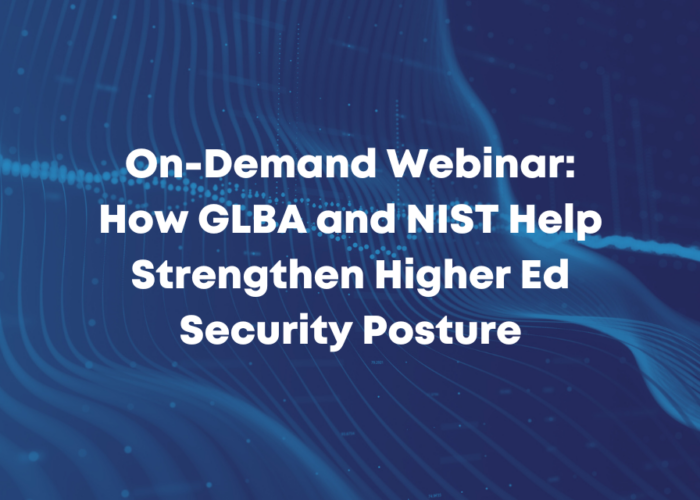For many of us, the best thing that can be said about 2020 is that it finally came to an end. Let’s face it: it was a challenging year by almost any measure. It seemed there were fewer of those Year in Review shows that are usually popular come mid-December, while our New Year’s Eve celebrations were likely more out with the old than in with the new. We’re all glad to put 2020 behind us.
But there’s a bright light on the horizon. Highly effective vaccines are rolling out, in no small part from the contributions of higher education. And an incredible transformation of higher education has begun. If there’s been a silver lining to emerge from the disruption, it’s that colleges and universities everywhere have started to rethink the way education is delivered.
We all agree there is something special about the college experience that goes beyond learning – access to diverse people and thought, community engagement, leaving home, and starting a new adventure. These make up the essence of the college experience and explain why a residential campus is so vital. New modalities will continue to mature, but the on-campus experience is essential for young adults coming into their own.
That said, schools are rapidly seeing the power of synchronous and asynchronous modalities to enhance traditional teach and learn. To make education more engaging and effective. To make it more accessible and affordable. Apogee believes technology is central to reimagining and strengthening higher education for the future. We’re committed to helping our customers leverage technology to realize their vision successfully.
So, while we’re sharing our optimism for the future with you, let’s dig into some predictions for the exciting year ahead. By the way, if you predicted at this time last year, a global pandemic would shut down the country and our schools, we tip our collective hats to you. Also, we’re hiring. 🙂
Here are our top ten predictions for higher education, beginning with a few we talk about a lot around Apogee:
- Blended learning will take center stage. Student feedback will inspire class planning and design changes in both traditional and online settings, creating a renewed focus on each school’s mission: to teach. Faculty will need more professional development, and demand for instructional designers, technologists, and computing specialists will increase. With less faculty time spent on research and more on teaching and learning, enrollment should get a boost.
- IT will become a critical contributor to the ramp of online teach and learn. The pandemic is forcing institutions to actively reconsider the role of technology in pedagogy. With technology historically underfunded and online teachers and instructional designers previously undervalued, IT leaders and Provosts will step up their investment in technology to support their school’s core mission going forward. Investment in key areas like the Internet of Things (IoT), machine learning, automation, and virtual reality (VR) will enhance and improve blended learning in 2020 and beyond.
- A new cabinet-level Chief Online Officer or Vice-Provost of Tech-Enabled Teaching position will be created. Flower Darby, scholar and expert in equitable and inclusive online pedagogy, stresses the increasing importance of online education. Effective pedagogical and technology preparation will be mission-critical as the two initiatives merge. A formal decisionmaker will emerge – with the authority and accountability to break down the silos between IT and those responsible for effective teach and learn – to ensure the technological and pedagogical requirements for a successful blended learning deployment are met.
- Generation Z will demand integrated career development and placement with academics. 57% of Gen Z attend college (higher than the percentage of millennials before them), viewing a degree as essential to jump-starting a career. As children of the Great Recession, they value stability and financial security and are value-conscious consumers. As they head to college, a flexible learning environment (e.g., blended learning), integration of career development with academics, exploration, and access to career connections will be key indicators of ROI. Gen Z will also demand that higher ed address the equity gaps in access, retention, and completion.
- Higher ed will increase enrollment of non-traditional students. The pandemic is only exacerbating fears over student debt, employment anxiety, and a sense that higher education is rigged to favor the well-resourced. Institutions that place a reinvigorated emphasis on effective pedagogy to make education accessible and affordable to non-traditional students will find success quickly. Rather than graduating students and turning them to the next bunch, schools could offer economically priced continuous learning programs to former students as a way of engaging students for 25 years or more.
- Higher ed will respond to historically not doing enough for underrepresented and marginalized students. Moments of crisis tend to expose our greatest weaknesses, and this has been no less true for higher education. The pandemic has only further illuminated the stark disparities in access to education and the resulting graduation rates. In its special The Post-Pandemic College report referenced above, the Chronicle of Higher Education suggests that colleges and universities offer better training to make online learning more inclusive and integrate instructional designers into academic affairs. The same report finds that Gen Z students, themselves diverse, will apply pressure to colleges and universities to respond to societal shifts and make online learning more equitable.
- Esports will grow in popularity. As this Washington Post article points out, major sports leagues like the NFL and NBA are witnessing a decline in enthusiasm among younger Gen Z sports fans. According to ESPN internal data, 96% of 12 to 17-year-olds identify as sports fans, but the share who call themselves “avid” has dropped from 42% to 34% in the past decade. With the pandemic likely accelerating the turn away from traditional sports (at least in the near term), pro sports leagues are ramping up their investment in esports to engage the next generation of fans.
- Higher ed will increase support for student mental health. As explained in the Chronicle of Higher Education special report previously referenced, Gen Z students were already dealing with mental health concerns at a rate higher than their predecessors before the pandemic began. Issues of isolation, for both students learning remote and those on campus, have compounded the problem. A survey of college and university presidents conducted by The American Council on Education (ACE) finds more than 66% of school presidents report an increase in mental health services utilization due to COVID-19. In response, nearly 60% have invested in virtual or tele-therapy/psychiatry services. Just less than half report implementing new student engagement strategies to address mental health and well-being (47%) and expanding campus access to digital mental health programs and platforms (43%).
- The Biden Administration will provide some level of student debt relief. Forgiveness of some student debit ($10K per loan would reach the most vulnerable borrowers) would be a rapid injection of cash into the economy and benefit college graduates of all colors and ethnicities. To be truly effective, debt forgiveness should be accompanied by policy changes designed to address the underlying cause: affordability. Debt forgiveness could serve as a critical first step toward new ways of thinking about higher education access.
- Higher education will rightsize. The go-it-alone behavior will finally end. Higher ed will look to partners, shared services, and consortia to get costs down and free up the thinkers and innovators within their organizations to focus on strategic priorities. 2021 and beyond will see more shared programs among public systems, reconfigured programs, campus mergers (public), acquisitions (private), and, unfortunately, more closures.
If you’ve stayed with us to the end, I hope you share our optimism for what higher education can accomplish this year and in those to come. While 2020 was difficult, it’s forced us all to take a hard look at what matters most, providing the opportunity to reexamine and tear down the traditions that no longer serve our higher education goals. Like everyone at Apogee, I’m passionate about our community’s success – our customers, partners, and students – and I’m hopeful for our collective growth and success.
In the meantime, if you’d like to learn more about blended learning and the value, it can bring to your school, check out our Apogee white paper Transform the Educational Experience through Blended Learning. Or, if you find the idea of implementing blended learning a little daunting due to limited budgets or constrained staff, we suggest reading Rightsize Your Campus Network Infrastructure to Win to help get you on the right track.








